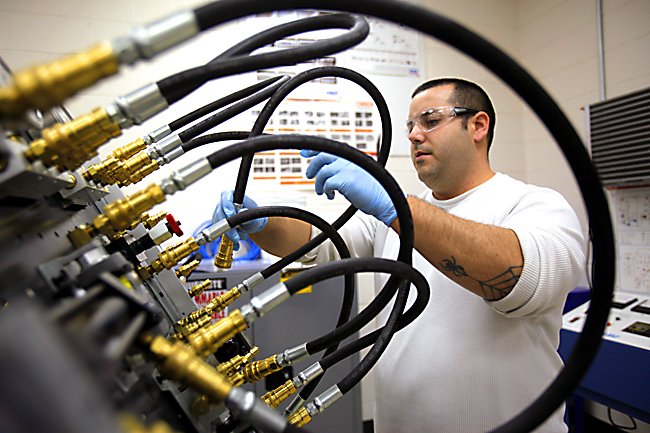State leaders' plans to push community colleges into a more prominent role in Tennessee higher education is working, according to a recent study released by the Tennessee Higher Education Commission.
While public universities such as the University of Tennessee at Chattanooga are increasing their overall share of college students, more local students are choosing two-year schools close to home.
Where do county residents attend college?
Hamilton County - 48.8 percent, Chattanooga StateBradley County - 53.3 percent, Cleveland StateMcMinn County - 41.9 percent, Cleveland StateMeigs County - 49.3 percent, Cleveland StateRhea County - 46.7 percent, Chattanooga StateSequatchie County - 68.3 percent, Chattanooga StateSource: Tennessee Higher Education Commission
"With the recession, the technology centers and community colleges were the greatest beneficiaries," said David Wright, associate executive director of policy, planning and research at the Higher Education Commission in Nashville.
Nearly 49 percent of Hamilton County students attended Chattanooga State Community College last fall, according to the commission's 2011 review of higher education in the state's 95 counties. In 2008, 42 percent of students chose Chattanooga State.
At the same time, UTC's share of local students has been on the decline - 30.6 percent in 2008 to 26.9 percent in 2011.
And much of the shift isn't a surprise, lawmakers and higher education leaders say. Early last year, legislators passed a bill - the Complete College Tennessee Act - that made it more difficult for four-year schools to compete with community colleges for some students.
The bill required universities to eliminate remedial classes, limiting all developmental education to community colleges. It also implemented financial incentives for schools that supported a two-plus-two system, in which students begin college at a two-year school, then transfer to a university for the final two years.
"We are bringing to an end the transfer difficulties that have existed in the past years," said Jim Catanzaro, president of Chattanooga State, which has grown 25 percent in the last three years to 12,500 students. "We are a primary path to a solid career in our own area. ... We should see more of an impact from that bill this year."
Former Gov. Phil Bredesen introduced the bill to the Legislature as part of his initiative to reform higher education. He said he believed the bill would nudge up the number of Tennesseans with at least an associate's degree.
And the commission study shows that the overall number of residents with a college degree is increasing.
In 2007, the first year the county surveys were conducted, 21.4 percent of residents reported having bachelor's degrees. That compares with 26.5 percent nationally. This year, 22.6 percent of state residents had at least a bachelor's degree, the study showed.
The portion of residents with associate degrees showed steeper improvement, from 5 percent in 2007 to 28.6 percent in 2011.
"In today's economy, people of all ages understand that they need some kind of college degree for the marketplace," said state Sen. Andy Berke, D-Chattanooga. "Community college is a wonderful choice for some people to achieve that."
Still, much more work needs to be done if Tennessee is going to have a competitive economy and create new jobs for families still struggling in the aftermath of the recession, Berke said.
"The numbers are inching up, but we've set lofty goals," he said. "It's going to take several years to get to the point that Tennessee needs to be."
In the meantime, schools are wary of more trims to higher education funding. The Tennessee Board of Regents and the University of Tennessee system are planning for another 2 percent cut this year, after years of brutal cuts.
The Tennessee Higher Education Commission has recommended a 7 percent increase in university tuition this year from $6,062 in 2010 at UTC and a 5 percent increase at community colleges from $3,211 in 2010 on average at community colleges.
"It's always good to be efficient, but we should be concerned about higher education funding," Berke said. "We are balancing the budget on the backs of students."
Contact staff writer Joan Garrett at jgarrett@timesfreepress.com or 423-757-6601.
